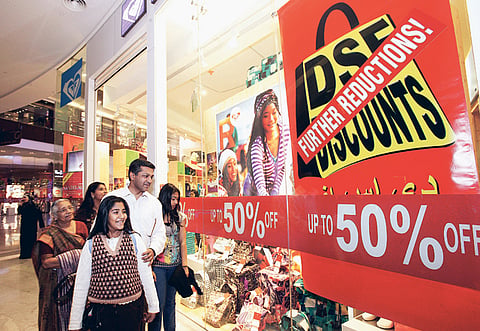Outlets urged to highlight uniqueness over lower prices
Consumer loyalty, convenience in best interest of brands

Dubai: Organisers and retailers are confident that the 15th edition of Dubai Shopping Festival (DSF) will continue to draw bumper crowds and stimulate spending despite concerns about soft consumer demand.
Prior to the global econ-omic downturn, retail sales during the DSF had snowballed from Dh2.15 billion in 1996 to Dh10.2 billion in 2006-07.
Since then, spending has been in a slight decline, coming down to Dh10 billion in 2008 and to Dh9.8 billion last year.
However, organisers said retail spending falls were minimal.
Colin Beaton, founder and managing director of Limelight Creative Services, a boutique retail strategy and design firm, believes the level of spending and the number of tourists seen during the peak of the Dubai boom will not be seen again for several years.
Confidence
"There is simply not enough consumer confidence in the market locally or globally to support a significant increase in spending," Beaton told Gulf News last Thursday.
"However, we do see a modest increase over last year as the global economy slowly recovers and consumer confidence slowly returns.
"We will likely see gradual increases each year in spending but we're unlikely to see significant gains year over year, unless of course the global economy recovers much quicker than forecast, which we do not believe will happen," Beaton added.
According to a MasterCard survey released last week, consumers in the UAE are approaching the next six months with optimism.
The survey's confidence score jumped sharply from 29.6 points to 86.1 points in the second half of 2009.
However, Datamonitor reported last Sunday that based on its Recovery from Recession survey, UAE consumers are "still doing it tough."
In its press release, the business information company said most consumers are still trying to live within their means, and have been paying down their debt, while also taking active measures to control discretionary expenditure.
Only a small segment of consumers, about 5 per cent, have increased spending on goods and services over the last six months.
A few (13 per cent) also feel their financial circumstances have improved, while more than half (55 per cent) feel they are significantly or at least slightly worse off than they were six months ago.
The majority of UAE consumers (58 per cent) are unwilling to splash out on big ticket or luxury items like cars, designer clothes and holidays and a sub-set simply cannot afford to splurge. About 40 per cent of consumers are also currently shopping around for the best prices.
Beaton said Dubai needs to modify its marketing strategy to allow retailers to regain the DSF results from past editions.
"Dubai has received a lot of attention over the past several years as being an expensive place to live and visit. This is the opposite of what Dubai needs to attract international shoppers.
"Dubai will need to change this perception locally and globally to one of an affordable retail destination that offers tremendous value," he said.
Beaton cautioned against offering perpetual discounts as it is not sustainable as a business model. He said it does not provide competitive advantage.
He believes that it would be in the best interests of retailers if they invest in programmes that deliver value beyond price or differentiate their brand, including the building of customer loyalty and the delivery of greater convenience. All this led to unique products or services, he said.
He said retailers can also benefit if their staff have greater knowledge of their products and if they sell a solution as opposed to simply an item, bundle products into an integrated package, promote customer support and implement stronger visual merchandising, among others.
Discounting
"Retailers cannot survive on the impact of sales alone. Perpetual discounting erodes brand equity as consumers begin to see you as only having a periodic price advantage, their behaviour changes and they soon begin to cherry-pick your store just for sales items," he added.
Richard Adams, Datamonitor analyst said retailers will "need to find and communicate the value sweet spot, the point where expectations are exceeded at a given price."
Astute marketing, promotions and product bundling, could be more beneficial than simple price competition, he added.
Sign up for the Daily Briefing
Get the latest news and updates straight to your inbox

![Latest discovery follows several 1,000-tonne-plus gold finds in the past year. [Illustrative image]](http://media.assettype.com/gulfnews%2F2024-11-27%2F9rs31cwr%2FStock_Gold_Mining_18c61d0bfc2_original_ratio.jpg?w=320&auto=format%2Ccompress&fit=max)
